Exploring Numeracy and ICT Skills in Research: A Detailed Report
VerifiedAdded on 2023/06/14
|7
|1308
|175
Report
AI Summary
This report delves into the application of numeracy and Information and Communication Technology (ICT) skills within the realm of research. It begins by defining research, emphasizing its systematic, objective, empirical, controlled, action-oriented, and validity-focused nature. The report highlights the importance of numeracy in logical reasoning and problem-solving, while also recognizing the role of ICT in global communication. Furthermore, the document outlines key principles for organizing research, including reducing the risk of harm, obtaining informed consent, ensuring the right to withdraw, avoiding deceptive strategies, and implementing independent reviews to maintain ethical standards and protect participants. The report concludes by underscoring that research is a structured approach to problem-solving, aided by ethical considerations and practical applications.
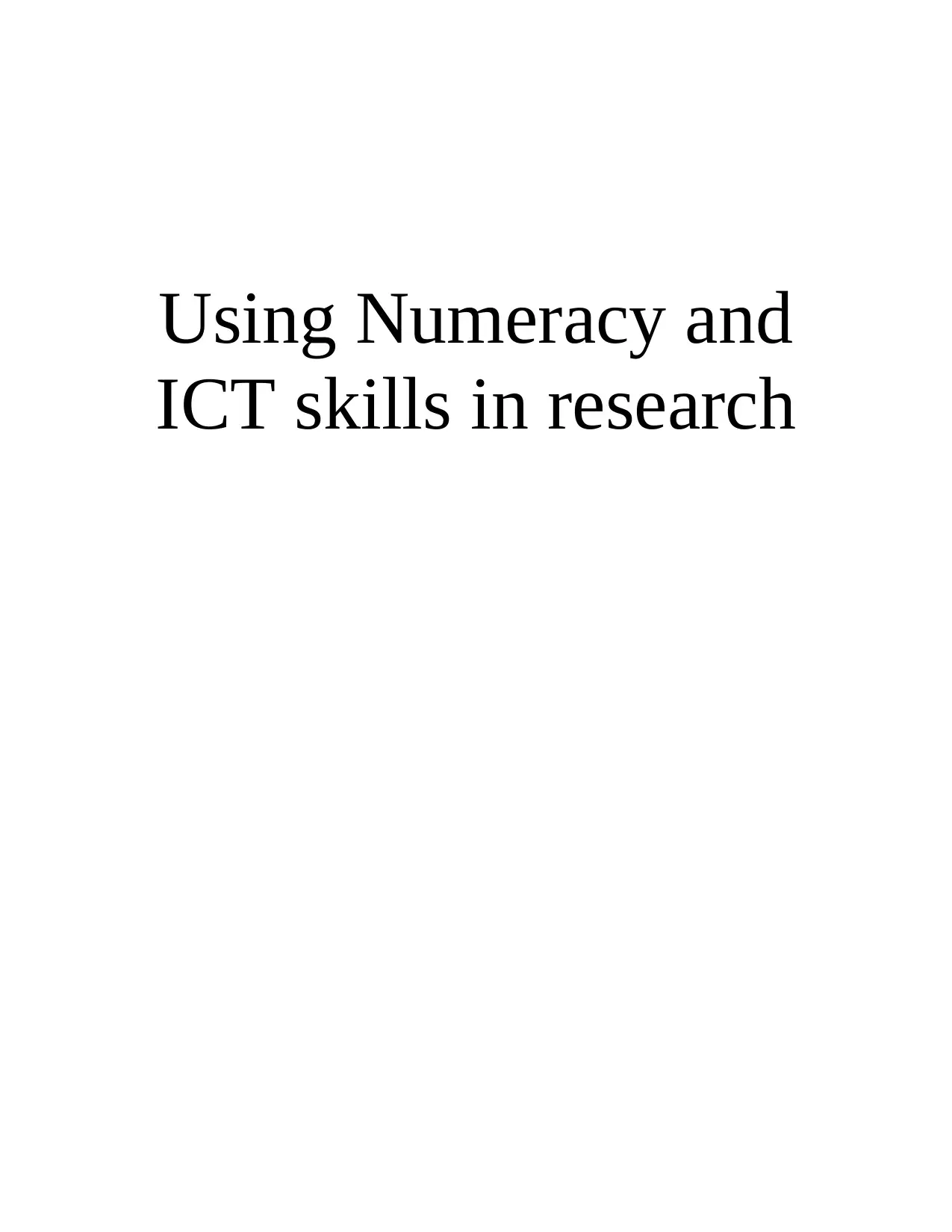
Using Numeracy and
ICT skills in research
ICT skills in research
Paraphrase This Document
Need a fresh take? Get an instant paraphrase of this document with our AI Paraphraser
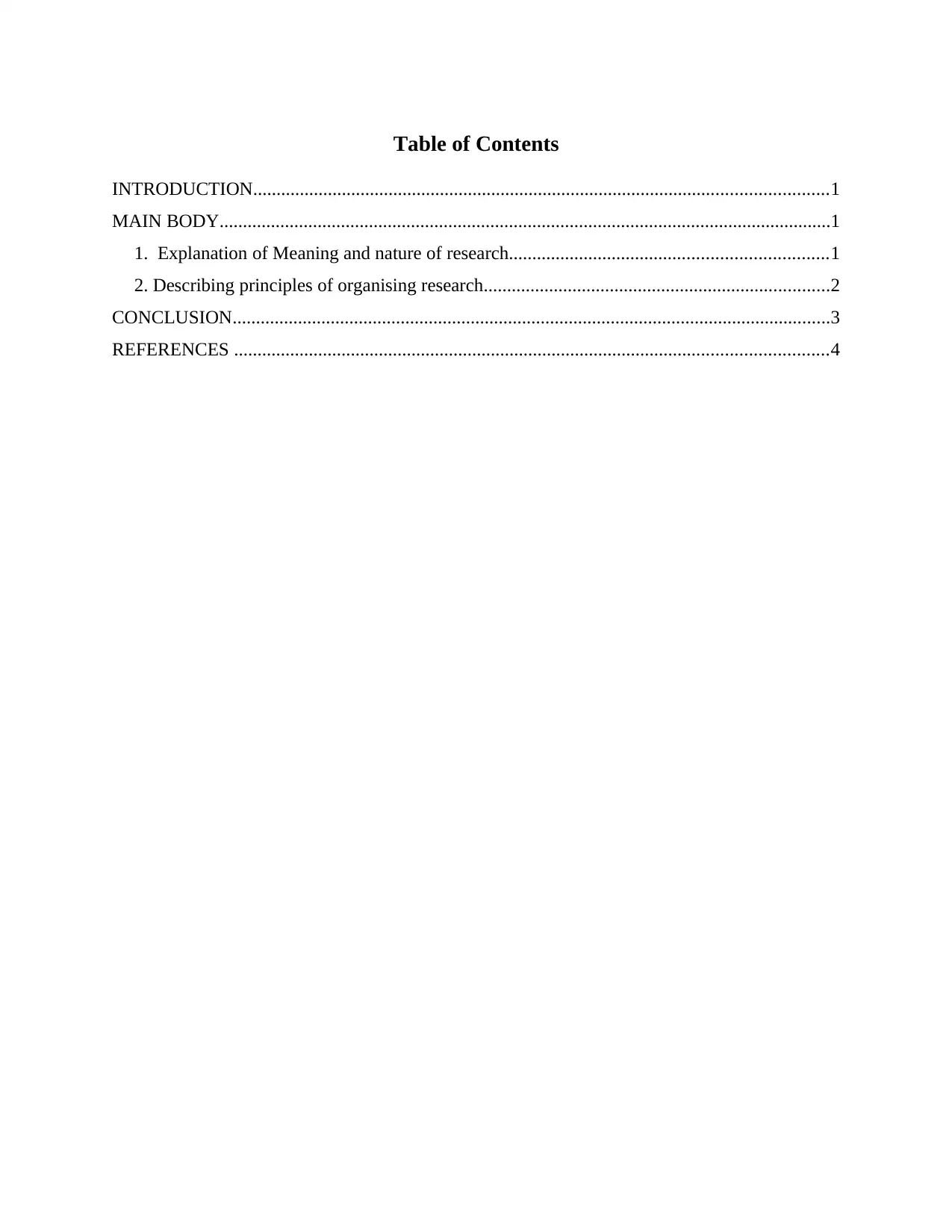
Table of Contents
INTRODUCTION...........................................................................................................................1
MAIN BODY...................................................................................................................................1
1. Explanation of Meaning and nature of research....................................................................1
2. Describing principles of organising research..........................................................................2
CONCLUSION................................................................................................................................3
REFERENCES ...............................................................................................................................4
INTRODUCTION...........................................................................................................................1
MAIN BODY...................................................................................................................................1
1. Explanation of Meaning and nature of research....................................................................1
2. Describing principles of organising research..........................................................................2
CONCLUSION................................................................................................................................3
REFERENCES ...............................................................................................................................4
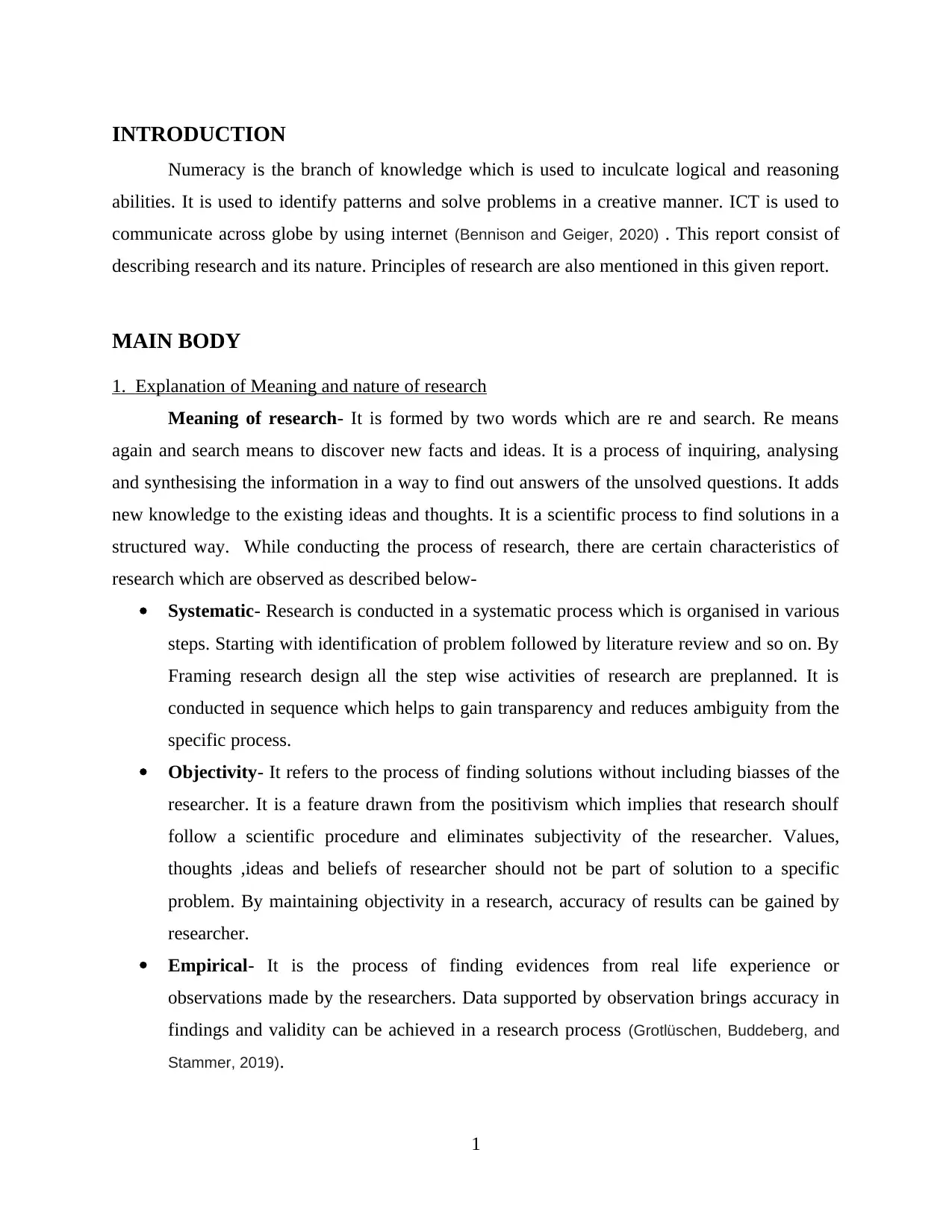
INTRODUCTION
Numeracy is the branch of knowledge which is used to inculcate logical and reasoning
abilities. It is used to identify patterns and solve problems in a creative manner. ICT is used to
communicate across globe by using internet (Bennison and Geiger, 2020) . This report consist of
describing research and its nature. Principles of research are also mentioned in this given report.
MAIN BODY
1. Explanation of Meaning and nature of research
Meaning of research- It is formed by two words which are re and search. Re means
again and search means to discover new facts and ideas. It is a process of inquiring, analysing
and synthesising the information in a way to find out answers of the unsolved questions. It adds
new knowledge to the existing ideas and thoughts. It is a scientific process to find solutions in a
structured way. While conducting the process of research, there are certain characteristics of
research which are observed as described below-
Systematic- Research is conducted in a systematic process which is organised in various
steps. Starting with identification of problem followed by literature review and so on. By
Framing research design all the step wise activities of research are preplanned. It is
conducted in sequence which helps to gain transparency and reduces ambiguity from the
specific process.
Objectivity- It refers to the process of finding solutions without including biasses of the
researcher. It is a feature drawn from the positivism which implies that research shoulf
follow a scientific procedure and eliminates subjectivity of the researcher. Values,
thoughts ,ideas and beliefs of researcher should not be part of solution to a specific
problem. By maintaining objectivity in a research, accuracy of results can be gained by
researcher.
Empirical- It is the process of finding evidences from real life experience or
observations made by the researchers. Data supported by observation brings accuracy in
findings and validity can be achieved in a research process (Grotlüschen, Buddeberg, and
Stammer, 2019).
1
Numeracy is the branch of knowledge which is used to inculcate logical and reasoning
abilities. It is used to identify patterns and solve problems in a creative manner. ICT is used to
communicate across globe by using internet (Bennison and Geiger, 2020) . This report consist of
describing research and its nature. Principles of research are also mentioned in this given report.
MAIN BODY
1. Explanation of Meaning and nature of research
Meaning of research- It is formed by two words which are re and search. Re means
again and search means to discover new facts and ideas. It is a process of inquiring, analysing
and synthesising the information in a way to find out answers of the unsolved questions. It adds
new knowledge to the existing ideas and thoughts. It is a scientific process to find solutions in a
structured way. While conducting the process of research, there are certain characteristics of
research which are observed as described below-
Systematic- Research is conducted in a systematic process which is organised in various
steps. Starting with identification of problem followed by literature review and so on. By
Framing research design all the step wise activities of research are preplanned. It is
conducted in sequence which helps to gain transparency and reduces ambiguity from the
specific process.
Objectivity- It refers to the process of finding solutions without including biasses of the
researcher. It is a feature drawn from the positivism which implies that research shoulf
follow a scientific procedure and eliminates subjectivity of the researcher. Values,
thoughts ,ideas and beliefs of researcher should not be part of solution to a specific
problem. By maintaining objectivity in a research, accuracy of results can be gained by
researcher.
Empirical- It is the process of finding evidences from real life experience or
observations made by the researchers. Data supported by observation brings accuracy in
findings and validity can be achieved in a research process (Grotlüschen, Buddeberg, and
Stammer, 2019).
1
⊘ This is a preview!⊘
Do you want full access?
Subscribe today to unlock all pages.

Trusted by 1+ million students worldwide
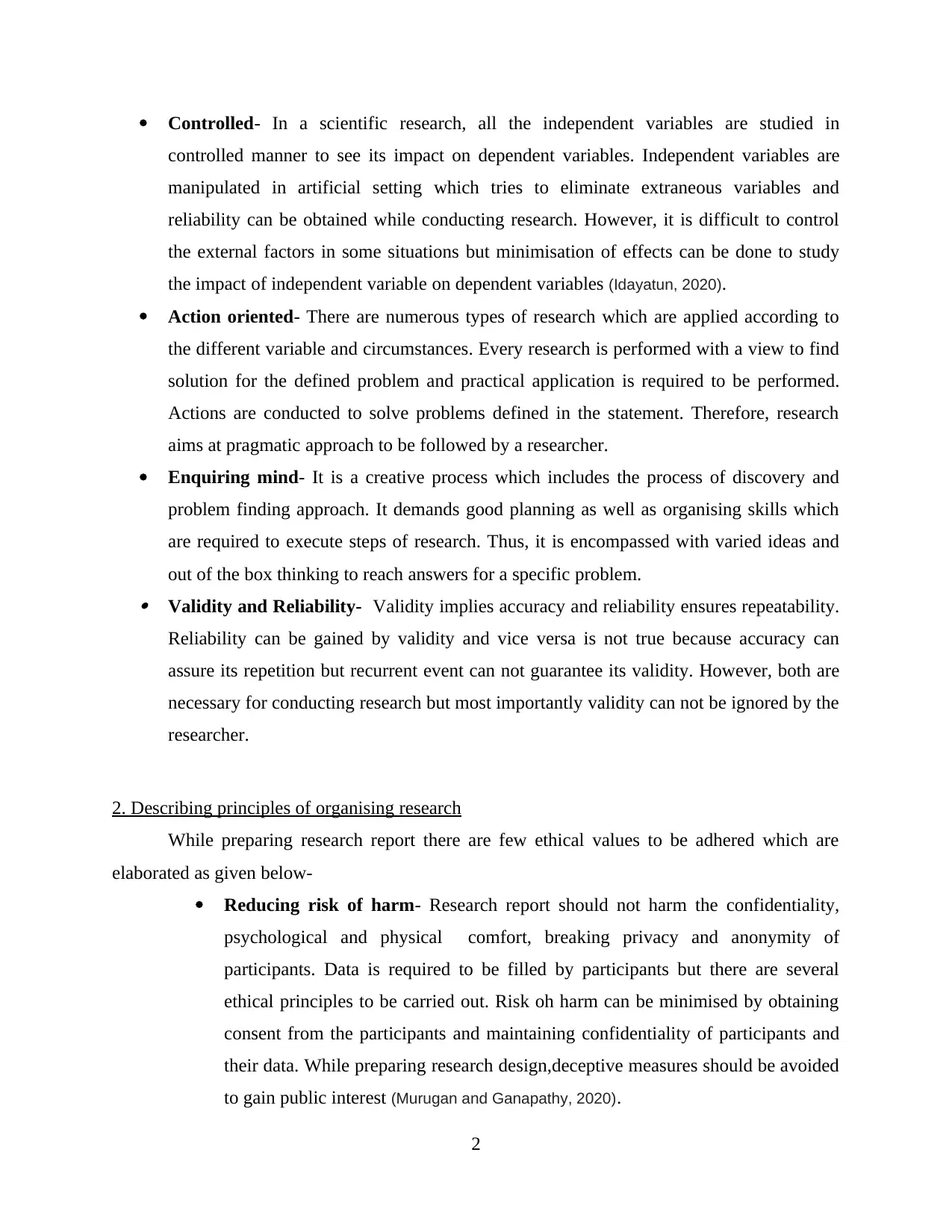
Controlled- In a scientific research, all the independent variables are studied in
controlled manner to see its impact on dependent variables. Independent variables are
manipulated in artificial setting which tries to eliminate extraneous variables and
reliability can be obtained while conducting research. However, it is difficult to control
the external factors in some situations but minimisation of effects can be done to study
the impact of independent variable on dependent variables (Idayatun, 2020).
Action oriented- There are numerous types of research which are applied according to
the different variable and circumstances. Every research is performed with a view to find
solution for the defined problem and practical application is required to be performed.
Actions are conducted to solve problems defined in the statement. Therefore, research
aims at pragmatic approach to be followed by a researcher.
Enquiring mind- It is a creative process which includes the process of discovery and
problem finding approach. It demands good planning as well as organising skills which
are required to execute steps of research. Thus, it is encompassed with varied ideas and
out of the box thinking to reach answers for a specific problem. Validity and Reliability- Validity implies accuracy and reliability ensures repeatability.
Reliability can be gained by validity and vice versa is not true because accuracy can
assure its repetition but recurrent event can not guarantee its validity. However, both are
necessary for conducting research but most importantly validity can not be ignored by the
researcher.
2. Describing principles of organising research
While preparing research report there are few ethical values to be adhered which are
elaborated as given below-
Reducing risk of harm- Research report should not harm the confidentiality,
psychological and physical comfort, breaking privacy and anonymity of
participants. Data is required to be filled by participants but there are several
ethical principles to be carried out. Risk oh harm can be minimised by obtaining
consent from the participants and maintaining confidentiality of participants and
their data. While preparing research design,deceptive measures should be avoided
to gain public interest (Murugan and Ganapathy, 2020).
2
controlled manner to see its impact on dependent variables. Independent variables are
manipulated in artificial setting which tries to eliminate extraneous variables and
reliability can be obtained while conducting research. However, it is difficult to control
the external factors in some situations but minimisation of effects can be done to study
the impact of independent variable on dependent variables (Idayatun, 2020).
Action oriented- There are numerous types of research which are applied according to
the different variable and circumstances. Every research is performed with a view to find
solution for the defined problem and practical application is required to be performed.
Actions are conducted to solve problems defined in the statement. Therefore, research
aims at pragmatic approach to be followed by a researcher.
Enquiring mind- It is a creative process which includes the process of discovery and
problem finding approach. It demands good planning as well as organising skills which
are required to execute steps of research. Thus, it is encompassed with varied ideas and
out of the box thinking to reach answers for a specific problem. Validity and Reliability- Validity implies accuracy and reliability ensures repeatability.
Reliability can be gained by validity and vice versa is not true because accuracy can
assure its repetition but recurrent event can not guarantee its validity. However, both are
necessary for conducting research but most importantly validity can not be ignored by the
researcher.
2. Describing principles of organising research
While preparing research report there are few ethical values to be adhered which are
elaborated as given below-
Reducing risk of harm- Research report should not harm the confidentiality,
psychological and physical comfort, breaking privacy and anonymity of
participants. Data is required to be filled by participants but there are several
ethical principles to be carried out. Risk oh harm can be minimised by obtaining
consent from the participants and maintaining confidentiality of participants and
their data. While preparing research design,deceptive measures should be avoided
to gain public interest (Murugan and Ganapathy, 2020).
2
Paraphrase This Document
Need a fresh take? Get an instant paraphrase of this document with our AI Paraphraser
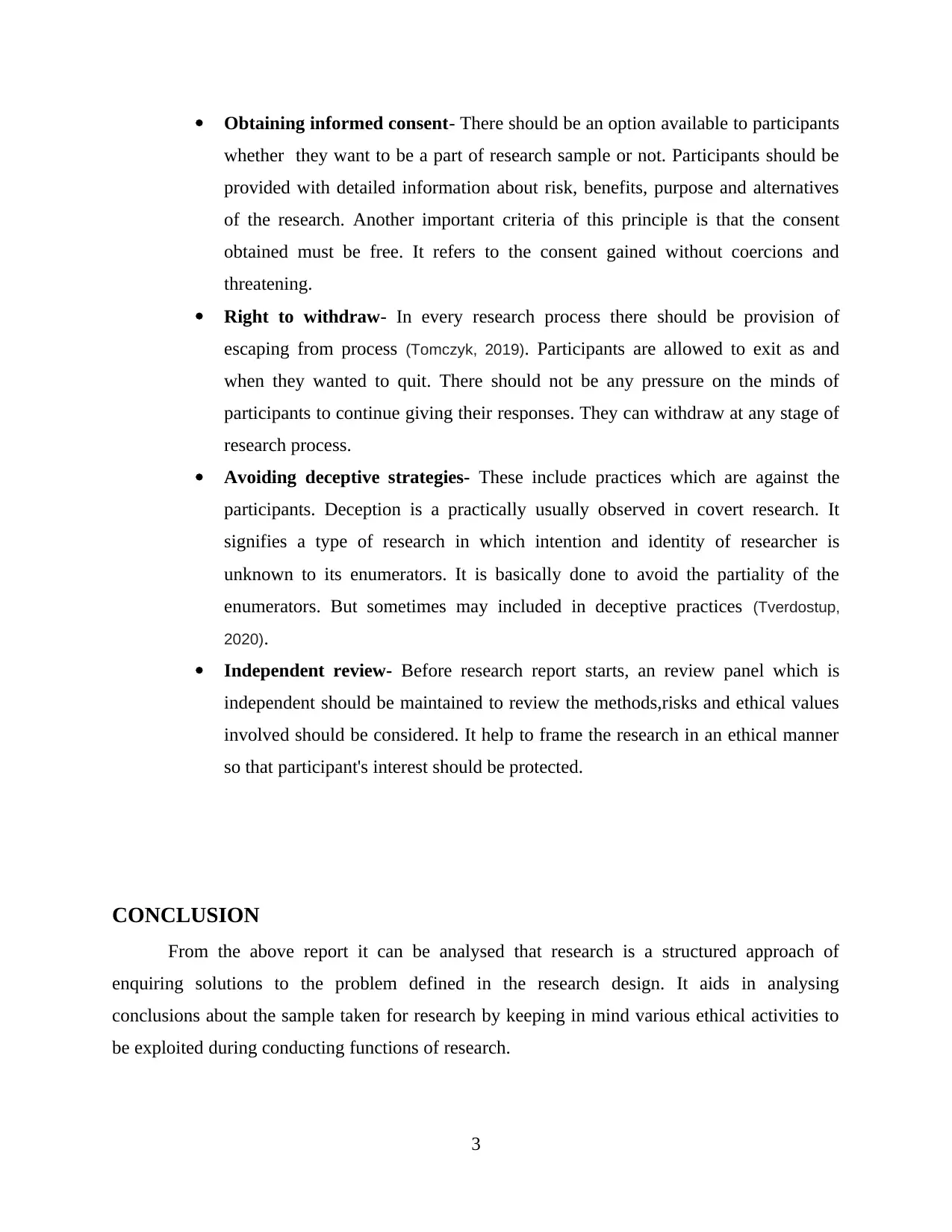
Obtaining informed consent- There should be an option available to participants
whether they want to be a part of research sample or not. Participants should be
provided with detailed information about risk, benefits, purpose and alternatives
of the research. Another important criteria of this principle is that the consent
obtained must be free. It refers to the consent gained without coercions and
threatening.
Right to withdraw- In every research process there should be provision of
escaping from process (Tomczyk, 2019). Participants are allowed to exit as and
when they wanted to quit. There should not be any pressure on the minds of
participants to continue giving their responses. They can withdraw at any stage of
research process.
Avoiding deceptive strategies- These include practices which are against the
participants. Deception is a practically usually observed in covert research. It
signifies a type of research in which intention and identity of researcher is
unknown to its enumerators. It is basically done to avoid the partiality of the
enumerators. But sometimes may included in deceptive practices (Tverdostup,
2020).
Independent review- Before research report starts, an review panel which is
independent should be maintained to review the methods,risks and ethical values
involved should be considered. It help to frame the research in an ethical manner
so that participant's interest should be protected.
CONCLUSION
From the above report it can be analysed that research is a structured approach of
enquiring solutions to the problem defined in the research design. It aids in analysing
conclusions about the sample taken for research by keeping in mind various ethical activities to
be exploited during conducting functions of research.
3
whether they want to be a part of research sample or not. Participants should be
provided with detailed information about risk, benefits, purpose and alternatives
of the research. Another important criteria of this principle is that the consent
obtained must be free. It refers to the consent gained without coercions and
threatening.
Right to withdraw- In every research process there should be provision of
escaping from process (Tomczyk, 2019). Participants are allowed to exit as and
when they wanted to quit. There should not be any pressure on the minds of
participants to continue giving their responses. They can withdraw at any stage of
research process.
Avoiding deceptive strategies- These include practices which are against the
participants. Deception is a practically usually observed in covert research. It
signifies a type of research in which intention and identity of researcher is
unknown to its enumerators. It is basically done to avoid the partiality of the
enumerators. But sometimes may included in deceptive practices (Tverdostup,
2020).
Independent review- Before research report starts, an review panel which is
independent should be maintained to review the methods,risks and ethical values
involved should be considered. It help to frame the research in an ethical manner
so that participant's interest should be protected.
CONCLUSION
From the above report it can be analysed that research is a structured approach of
enquiring solutions to the problem defined in the research design. It aids in analysing
conclusions about the sample taken for research by keeping in mind various ethical activities to
be exploited during conducting functions of research.
3
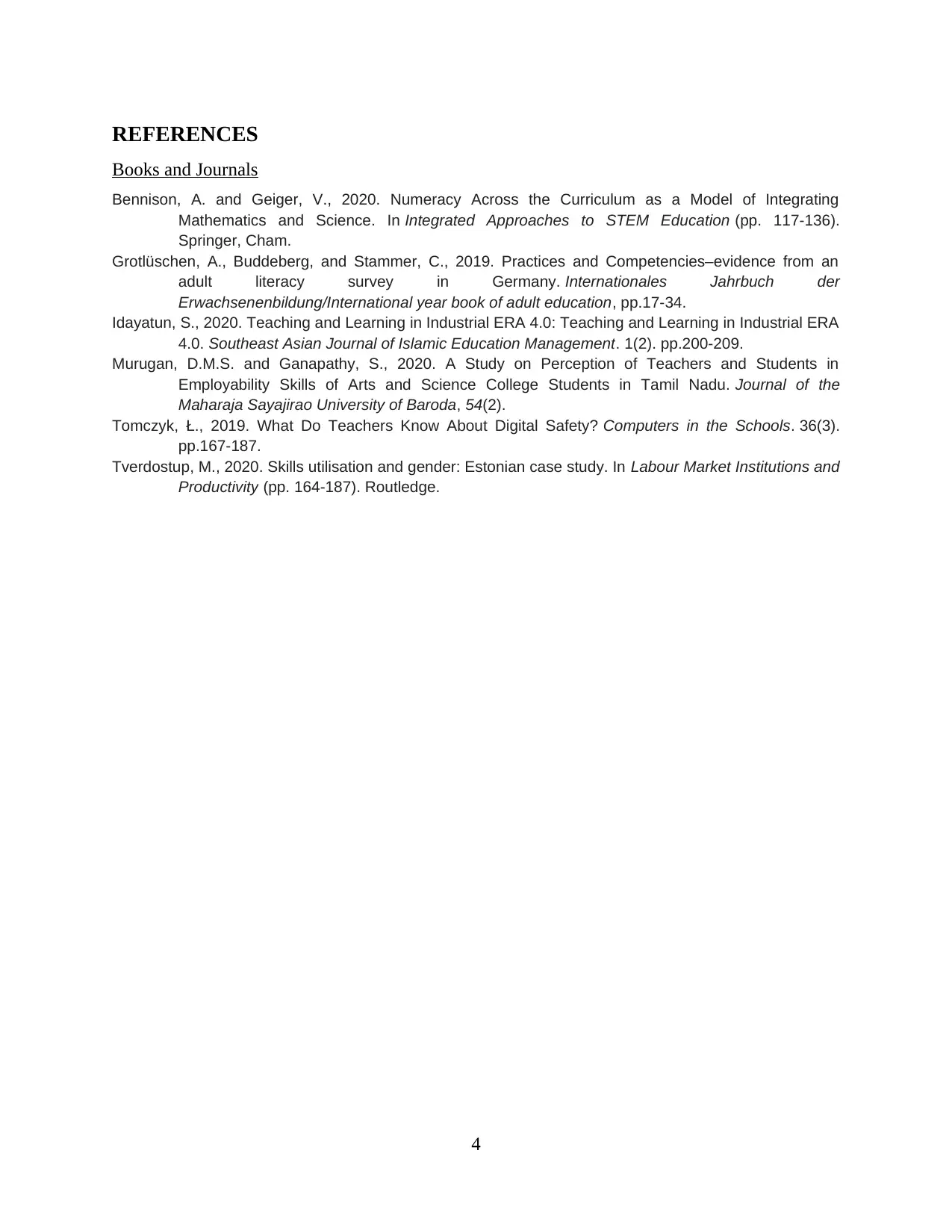
REFERENCES
Books and Journals
Bennison, A. and Geiger, V., 2020. Numeracy Across the Curriculum as a Model of Integrating
Mathematics and Science. In Integrated Approaches to STEM Education (pp. 117-136).
Springer, Cham.
Grotlüschen, A., Buddeberg, and Stammer, C., 2019. Practices and Competencies–evidence from an
adult literacy survey in Germany. Internationales Jahrbuch der
Erwachsenenbildung/International year book of adult education, pp.17-34.
Idayatun, S., 2020. Teaching and Learning in Industrial ERA 4.0: Teaching and Learning in Industrial ERA
4.0. Southeast Asian Journal of Islamic Education Management. 1(2). pp.200-209.
Murugan, D.M.S. and Ganapathy, S., 2020. A Study on Perception of Teachers and Students in
Employability Skills of Arts and Science College Students in Tamil Nadu. Journal of the
Maharaja Sayajirao University of Baroda, 54(2).
Tomczyk, Ł., 2019. What Do Teachers Know About Digital Safety? Computers in the Schools. 36(3).
pp.167-187.
Tverdostup, M., 2020. Skills utilisation and gender: Estonian case study. In Labour Market Institutions and
Productivity (pp. 164-187). Routledge.
4
Books and Journals
Bennison, A. and Geiger, V., 2020. Numeracy Across the Curriculum as a Model of Integrating
Mathematics and Science. In Integrated Approaches to STEM Education (pp. 117-136).
Springer, Cham.
Grotlüschen, A., Buddeberg, and Stammer, C., 2019. Practices and Competencies–evidence from an
adult literacy survey in Germany. Internationales Jahrbuch der
Erwachsenenbildung/International year book of adult education, pp.17-34.
Idayatun, S., 2020. Teaching and Learning in Industrial ERA 4.0: Teaching and Learning in Industrial ERA
4.0. Southeast Asian Journal of Islamic Education Management. 1(2). pp.200-209.
Murugan, D.M.S. and Ganapathy, S., 2020. A Study on Perception of Teachers and Students in
Employability Skills of Arts and Science College Students in Tamil Nadu. Journal of the
Maharaja Sayajirao University of Baroda, 54(2).
Tomczyk, Ł., 2019. What Do Teachers Know About Digital Safety? Computers in the Schools. 36(3).
pp.167-187.
Tverdostup, M., 2020. Skills utilisation and gender: Estonian case study. In Labour Market Institutions and
Productivity (pp. 164-187). Routledge.
4
⊘ This is a preview!⊘
Do you want full access?
Subscribe today to unlock all pages.

Trusted by 1+ million students worldwide

5
1 out of 7
Related Documents
Your All-in-One AI-Powered Toolkit for Academic Success.
+13062052269
info@desklib.com
Available 24*7 on WhatsApp / Email
![[object Object]](/_next/static/media/star-bottom.7253800d.svg)
Unlock your academic potential
Copyright © 2020–2026 A2Z Services. All Rights Reserved. Developed and managed by ZUCOL.




